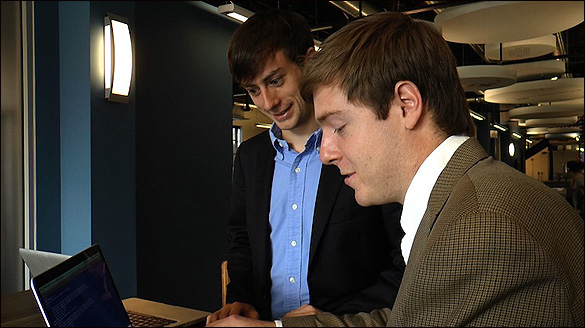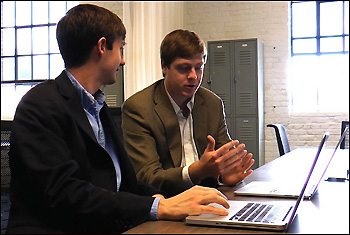
SSE’s analytics is cause for optimism
Combining their love of college football and knowledge of the New York Stock Exchange – and some savvy and sophisticated technological skills – Will Schreiber (BA ‘13, economics) and McArthur Gill (BE ’13, mechanical engineering) developed Stadium Stock Exchange during their final semester. In one year, the venture has seen its stock rise.
Schreiber had the notion to apply to the Nashville Entrepreneur Center last January; at a center-hosted ‘pitch day’ event in April representatives of Nissan North America offered $50,000 to partner with him and McArthur on the startup; in August Stadium Stock Exchange was launched. It turned out that Franklin-based Nissan is trying to improve its brand through its ESPN Saturday night college football ‘Game of the Week’ and as title sponsor for the Heisman Trophy award presentation.
“We were shocked that Nissan would be interested in college football or interested in us,” said Schreiber, who later found out that the company was looking for new ways to connect with younger football fans and television viewers. With Nissan’s help, they set out to make their sports stock exchange work. In July, Schreiber detailed in a Blog post on the SSE website the underlying technology involved, beginning with “the heart of the magic – the trading algorithm.”
The platform, General Application Market Exchange (or GAME), according to Schreiber, is fast, flexible, and works like the New York Stock Exchange. It allows players to buy and sell orders (in this case, stock is college football teams), and those orders wait to be paired with corresponding ones. When trades are finalized, prices are updated.
Basically, here’s how Stadium Stock Exchange works
Players sign up in a league comprised of friends and colleagues. Each is given $100,000 to be used to buy shares of stock in college football teams.
The price for each team is set at the beginning of each season by an expert prognosticator based on the predicted number of wins that a team will rack up. Every victory is worth $10. The season runs from Week 1 to the national championship game.
Before the first game, the stock price is set based on predictions for that team’s record (including bowl games). Each win is worth $10. This past season, Auburn’s stock opened at $50, but the team went on to win 12 games before losing in the BCS National Championship. Therefore, if a player purchased 100 shares of Auburn stock at $50/share back in August, the final stock price (at $10 a win) would be $1,200/share, and that player would have earned $120,000 on the Tigers.
Once the market opens, prices are determined by demand. The more people that buy a stock, the higher that stock’s price goes. The more people that sell a stock, the lower that stock’s price goes. Folks buying Auburn stock in October did not see higher returns than those who bought in August.
CEO Will Schreiber points out that it is wiser to buy stock in teams that are trading below their actual worth. The point is to buy stock in teams you think will outperform expectations, he says.
In SSE, there is no limit to the number of players in a specific league. And there is no limit to the amount of stock you can buy. At the season’s end, the winner is person who has wealthiest portfolio in each league. A friend of the developers who is more football fan than market watcher had turned his $100,000 into a portfolio valued at $864,000 – and that was when there were several bowl games remaining to be played.
“Players need to know ‘buy’ and ‘sell short’ — that’s pretty much it,” said Chief Product Officer McArthur Gill.
GAME worked, and Nissan committed another $50,000 to SSE’s second season, but Schreiber isn’t celebrating its success just yet.
“Some things were better than expected; some things were not. In a first season, that’s standard I suppose,” he said, noting that many people now are trying to start businesses, and most are doomed to fail. “Statistically, we will fail. But we’re delusional enough to try,” he added with a wry smile.
Gill says the game’s analytics is cause for optimism. The numbers on ‘the back end’ show a lot of trades and transactions, along with player feedback – nearly all of it positive.
“I was more optimistic than Will. I was sure it would work,” said Gill. “We did some market research and looked at other efforts. People had tried this before, but most were using real money and that became a little too much to control.”
In Stadium Stock Exchange there is no real money, so no cash-outs. It, like most fantasy sports games, is free to play. The ultimate challenge is to compete with friends and establish bragging rights. With college football, says Gill, bragging rights is an essential component to being a loyal fan. So each win is crucial; each loss devastating, and therein lies SSE’s appeal.
Demographics did not lead Gill and Schreiber to make the game – they knew it was going to appeal to young, educated males, and SSE has a host of highly educated lawyers and accountants in various leagues. But they did discover a few surprises.
“We did find that the average college football fan is more educated than the average NFL fan, and people that trade stocks on average are more educated,” Schreiber said. “Now, it’s a bit shocking when you look at Alabama fans on TV and think ‘no way that’s true,’ but it is.”
The ‘Bama jab is more playful than hurtful, considering he (Birmingham-born Alabama fan) and McArthur (Montgomery-born Auburn fan) both grew up in that Tennessee border state where college football is “all we’ve got.” Growing up they had to pick a side – Auburn or Alabama – which now gives them personal insight into college football’s loyalty, allegiance and rivalries. Those tenets are what draw players to Stadium Stock Exchange.

They met at Vanderbilt, ironically in a web development class. They say the university’s encouragement for students to take on side projects and develop new ideas, as long as they don’t impede academics, pushed them to find time for SSE. The quality of the website, the readability of the text, and the time devoted to making it work (six months and 280,000 lines of code) is a testament to the Vanderbilt experience.
Still, Gill dropped the ball on investing in Commodores football stock this season. “Yeah, that was me last year. No one saw another nine-win season.” Now that head coach James Franklin and All-American Jordan Matthews have moved on, it will be interesting to see how the team fares in 2014 – and how far the team’s stock may fall in SSE.
Somewhere around late June or early July the next season will get rolling with initial stock prices posted. Lessons learned in year one will direct whatever changes need to be made.
“We should have marketed SSE earlier. We didn’t market it well – we were testing it,” Schreiber said. “We will be using campus reps across the country this year; getting on sports radio shows, that sort of thing.”
The ultimate goal is to sell SSE, according to Schreiber, but now the push is to grow the product and increase the user base – making the venture cash-flow strong.
Still, can a sports fantasy website live up to the university’s ‘best and brightest’ tag?
“People think what we’re doing is not a big deal. But it’s not a big deal until it is a big deal,” Schreiber said. “My friends are finance majors. All are getting big jobs on Wall Street, making six figures out of college. They probably look at this as sophomoric, but I love it.
“We certainly want this to be wildly successful, and it is sophomoric until we get to the point where we say ‘look at the value it actually has’ – and the burden for that is on us.”